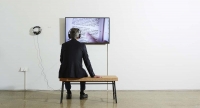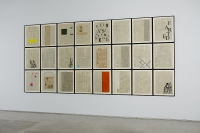Known for his endlessly creative use of words, James Joyce invented a whole host of fairly outlandish words and phrases in his writing. The word Whenceness appears in Ulysses, meaning something’s birthplace or source point, the place from which it arises and develops.
For this exhibition, Byrne shows two videos which were developed during her fellowship at the Whitney Independent Study program alongside 24 new works paper. The works all deal with the intersection between fiction and reality derived from Joyce’s Ulysses Episode 12: Cyclops which deals with nationality, race, anti-semitism and what it means to be Irish, ‘‘A nation?’ says Bloom, ’ A nation is the same people living in the same place”.
Resentful nationalistic impotence structures the narrative core of the “Cyclops” episode. The impotence underlying the resentment stems from the inability to create an independent subject through any other terms than those of the master, given that postcolonial revivalist movements emulate the imperial subject. Two opposing forces—enforcing and subverting the dialectic of nationalism—form the core of the exchange between Leopold Bloom and the anti–Semitic Citizen in Barney Kiernan’s tavern. The issue of Bloom’s Judaism is raised as a central point of conflict with the Irish-nationalist Citizen. Bloom counters the racial identification of nationality with the more modern interpretation of a group of disparate people working together for a common goal. Instead of looking to the past and bloodlines, he finds that a nation should be people creating their future. Casting a light on this aspect of Ulysses is a particularly pertinent gesture given 2016 marks the 100 anniversary of the Irish Free State
Using original newspaper from 16th June 1904, the day Ulysses is set, the works on paper focus on issues still present such as immigration an increased nationalism. Usually we look at that day through the prism of the book, by using collage, text, paint and masking tape, Byrne highlights the news of the real day which is mostly known through fiction, considering what changes over time and what stays the same.
Rakoczys March is a 41minute video in which two uilleann pipers attempt a composition referenced in Ulysses as played by Irish pipers. Byrne’s video charts their attempt to play the piece, along with their rising frustration. The music, once the unofficial national anthem of Hungary, is said to have been played by Irish pipers as Lipóti Virag (Leopold Bloom) departs for Százharminczbrojúglyás-Dugulás in James Joyce’s Ulysses (episode 12, Cyclops ).
While Pure Codology focuses on a hidden joke - Százharminczbrojúglyás-Dugulás - overlayed with a fictitious narrative set within the context of the rise in left wing political policies in Hungry. The premise of an ‘in joke’ assumes that there is a group of people with enough common ground to share the joke, and furthermore that there is another group that is outside the joke. Both works point to the tragedy of the impossibility of communication’, establishing that music doesn’t cross all cultures and jokes frequently get lost in translation.
In the work Byrne explores words and phrases censored, self censored and untranslatable words in Cyclops. The untranslatable words are those whose meaning have a performative element, changing across generations, time and language, for example race, people and culture and where many crucial meanings have been shaped by a dominant class and by professions operating within its terms. No word ever finally stands on its own, since it is always an element in the social process of language, and its uses depend on complex and systematic properties of language itself.


